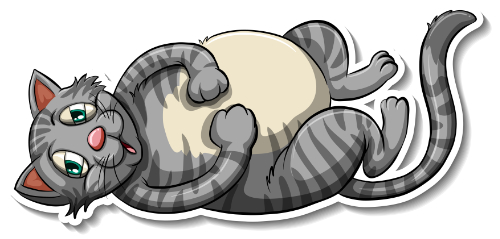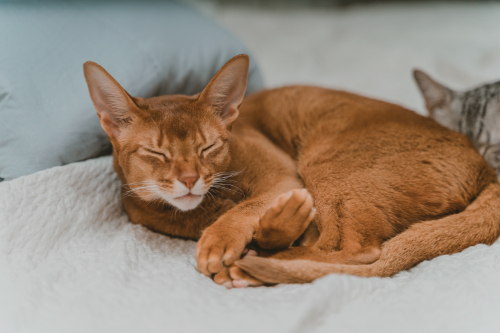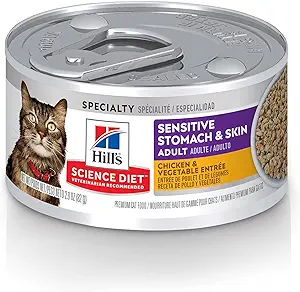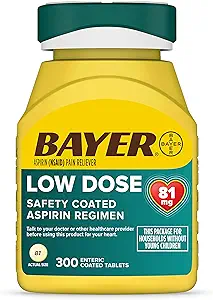Symptoms in a cat with abdominal pain
Your cat has an abdominal pain and of course you want to solve this for him. First, of course, you have to be sure whether your cat really has an abdominal pain. You can recognize abdominal pain in your cat because your cat has withdrawn a bit. He is often grumpy and sometimes wants to take it out on a fellow housemate. He clearly behaves differently than you are used to from him.
Pose of a cat with abdominal pain
If your cat has an abdominal pain, he often sleeps with its paws under his belly and turns his belly (and back) into a rolled-up ball. He makes himself as small as possible. You can also often see a kind of frown on his forehead and he usually keeps his eyes closed. His head is not proudly erect but hangs a little forward. If your cat allows it, you can feel his belly. You will feel that he has tensed up his abdominal muscles, which can make his belly feel quite hard. But be careful, because some cats can react very angry if you touch their belly when they have abdominal pain.
What causes abdominal pain in cats?
If your cat has an abdominal pain, then in most cases your cat has problems with its stomach or intestines. You can also see in the coming days that he will vomit or get diarrhea. But there are many organs in the abdominal cavity and any of them can hurt. Think of the liver, the pancreas, the kidneys, the bladder, etc. With male cats, especially with overweight male cats, it is also possible that a urine stone is stuck in his penis. As a result, he cannot urinate and his bladder becomes overfilled. This is very painful for him. It is therefore important that you try to find out whether your cat has urinated in the past few hours. Does he keep going to the litter box without leaving a pee? Then you should immediately go to your vet. Also in the evening or at the weekend!

Treatment of abdominal pain in cats
Rule out that your cat can't urinate
First, you need to ask yourself if your cat, if it is a male cat, has urinated in the past 12 hours. If you are unsure about this, don’t let him go outside and keep him enclosed to check if he is peeing. When in doubt, it is best to ask a vet to feel his bladder to rule out a bladder blockage. This is a very good reason for your cat to have abdominal pain.
gastrointestinal pain?
Is the chance of a bladder blockage minimal? Then you go see if your cat wants some food. Just put it in front of him and see what he’s going to do. To do this, use something that he normally really likes. Doesn’t he eat, or doesn’t he eat it as enthusiastic as he normally would? Then there is a good chance that he is nauseous and has an abdominal pain. Do you also hear his belly bubbling and simmering? Then he probably has pain in his intestines.
In case of gastrointestinal complaints, it is best to offer him easily digestible food such as boiled chicken breast or a little white rice. Try to put as little fat in his diet as possible because it is more difficult to digest and therefore gives your cat extra abdominal pain. If you want, you can also offer this food to your cat.
It is also wise to offer your cat probiotics to support its intestinal flora and to prevent diarrhea because its intestinal flora has become upset. In the meantime, keep your cat indoors to check whether he can still urinate and defecate properly and whether your cat’s abdominal pain is not getting worse.
Foreign object
It is not common in cats, but in some cases cats will play with something small and then swallow it. Especially young, playful cats do this. If such an object gets stuck in the intestines, food cannot pass through. Your cat will vomit, has a pretty bad abdominal pain, and won’t pass stools either. He often poops once after the start, namely the food that was digested before the object started blocking his intestines. But after that there is nothing more.
This is a life-threatening situation and if you suspect that this may be the case with you, it is important that you take your cat to your vet urgently, even if it is in the evening or weekends. If it turns out that there is indeed an object stuck, your cat will unfortunately have to undergo surgery to solve his abdominal pain and prevent him from dying.
Give pain killer to your cat
As long as your cat has no gastrointestinal complaints, you can give your cat a painkiller if he has an abdominal pain. If you still have it at home from a previous vet visit, use it. For example metacam or novacam. You can also ask your vet if you can pick up a painkiller for your cat. But in most cases, this is only allowed when you come to your vet for a consultation with your cat. If you don’t want to visit your veterinarian, you can offer your cat aspirin. WATCH OUT!!! YOU MAY ONLY USE ASPIRINE. NO PARACETAMOL, IBUPROFEN OR OTHER MEDICINE!!! Those other substances are deadly for your cat.
Aspirin can be given to your cat once every 2 days at a dose of 10mg per kg of your cat’s weight. Many cats weigh about 4 kg and so a cat of that weight may receive 40mg once every 2 days. Most aspirin tablets contain 400mg, so you can only give a 10th piece every 2 days. So that’s just a very small piece! The aspirin below is a lot smaller dosage so you can give your cat a half a tablet once every two days.
Why can’t you use aspirin if your cat has gastrointestinal complaints? Well, that’s because aspirin belongs to the NSAID painkillers and they are extra burdensome on the gastrointestinal system. For example, if there is an inflammation of the stomach, NSAIDs will help with the pain, but they may make the problem worse.
Why not use paracetamol or ibuprofen on your cat?
Cats lack a certain mechanism in their bodies to get rid of some kind of medicine. That is why they are not allowed to receive certain medicines because otherwise they cannot remove them from their body and they will therefore be poisoned. They will die of it. This applies to paracetamol and ibuprofen, but also, for example, to flea products intended for dogs.

When should you see your vet?
When your cat’s abdominal pain is very intense, your cat really suffers from it, then it is wise to go to your vet. With mild forms of abdominal pain where your cat still wants to eat (something) and he just poops and pees, you can wait a few days. If your cat still has abdominal pain after 3-4 days, it is best to go to your vet. He can then try to find out which organ is causing the pain and start a treatment for it. Your veterinarian can also prescribe a suitable painkiller for your cat to ease the pain.
Good luck!
Hopefully your cat will soon no longer have an abdominal pain and can return to a normal active life. We wish you and your cat good luck!




